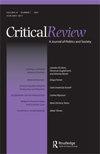事后信任,而非事后真相
IF 1.7
3区 社会学
Q4 POLITICAL SCIENCE
引用次数: 0
摘要
“后真相”这个新词通常被用来描述一种政治,在这种政治中,虚假和有偏见的信仰破坏了公众舆论和政策制定。简化和扩大我们对形容词的使用,使其超越目前的狭义,可以使后真理成为历史、政治和哲学词典中的一个有用的补充。然而,它目前的使用(往好了说)毫无帮助,令人分心,(往坏了说)被认为是有辱人格和羞辱。当代政治更倾向于后信任。当来自知识工作者社区或投诉者社会群体(如提供性侵证词的女性)的证词对公众舆论和政策制定失去影响时,政治就变成了后信任。本文章由计算机程序翻译,如有差异,请以英文原文为准。
Post-Trust, Not Post-Truth
ABSTRACT The neologism post-truth is commonly used to characterize a polity in which false and biased beliefs have corrupted public opinion and policymaking. Simplifying and broadening our use of the adjective beyond its current narrow meaning could make post-truth a useful addition to the lexicons of history, politics, and philosophy. Its current use, however, is unhelpful and distracting (at best), and experienced as demeaning and humiliating (at worst). Contemporary polities are better characterized as post-trust. A polity becames post-trust when testimony from either a community of knowledge workers or a social group of complainants—such as women who give testimony of sexual assault—loses influence upon public opinion and policymaking.
求助全文
通过发布文献求助,成功后即可免费获取论文全文。
去求助
来源期刊

Critical Review
POLITICAL SCIENCE-
CiteScore
1.30
自引率
12.50%
发文量
17
期刊介绍:
Critical Review: A Journal of Politics and Society is a political-science journal dedicated to advancing political theory with an epistemological bent. Recurrent questions discussed in our pages include: How can political actors know what they need to know to effect positive social change? What are the sources of political actors’ beliefs? Are these sources reliable? Critical Review is the only journal in which the ideational determinants of political behavior are investigated empirically as well as being assessed for their normative implications. Thus, while normative political theorists are the main contributors to Critical Review, we also publish scholarship on the realities of public opinion, the media, technocratic decision making, ideological reasoning, and other empirical phenomena.
 求助内容:
求助内容: 应助结果提醒方式:
应助结果提醒方式:


